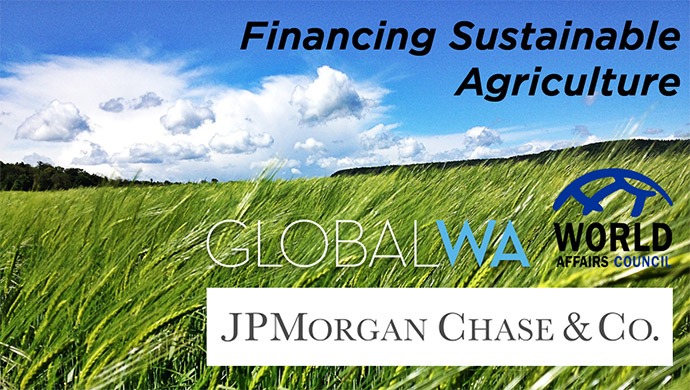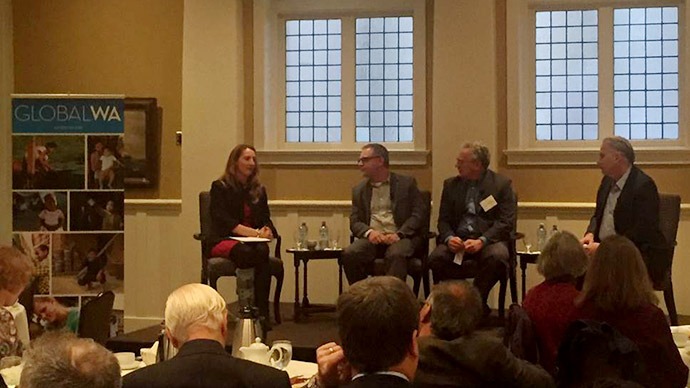By Elsa Watland

On November 2nd, Global Washington and the World Affairs Council partnered to host a panel discussion on Financing Sustainable Agriculture. The panelists represented a range of stakeholders involved in various aspects of agriculture financing. Panelists included Matthew Arnold, managing director and global head of sustainable finance at JPMorgan Chase (JPMC); Steve Hollingworth, president & CEO of the Grameen Foundation; and Paul Moseley, who leads agriculture finance strategy for the Bill & Melinda Gates Foundation (BMFG). The conversation was moderated by Kristen Dailey, executive director of Global Washington.
The future of global food security is a significant challenge humankind will face in the coming years, and smallholder farmers hold the key to this challenge. 2.2 billion people depend on agriculture for their livelihood and 80 percent of the world’s poor are smallholder farmers. By 2050, food production must double to feed the projected global population of 9.8 billion. This means that we must focus on finding sustainable, long-term solutions to ensure agricultural systems are more efficient, and can meet our planet’s rising nutritional needs in three decades.
The risks borne by smallholders are a significant hurdle to achieving sustainable agriculture systems. Small-scale farmers are vulnerable to price variation and the impacts of climate change, and often lack essential crop cultivation knowledge. The high-risk nature of their business also means that it can be prohibitively expensive for them to access the capital they need to cultivate the land.
During the conversation, each panelist offered his organization’s perspective on how to address this monumental task. As a global corporate investment bank, JPMorgan Chase is not the typical business one thinks of when it comes to helping small-scale farmers. But the company has committed $200 billion to focus on poverty and inclusive economic growth, aligning its business with the UN Sustainable Development Goals. As part of this effort, JPMC works with impact investing funds and various intermediaries to provide credit services for smallholder farmers who cultivate cash crops like coffee and cocoa.
The Bill & Melinda Gates Foundation takes a different approach, focusing on the middle segment of smallholder farmers, and working with many partners, including governments, lenders, and service providers like IDH, a sustainable trade initiative, to find ways to make lending to smallholders profitable. The foundation targets these farmers in hopes of lifting some of the bottom 60% of farmers into the loose value chain space, and helping them become more creditworthy in the process. Paul Moseley noted that when it comes to the provision of services, you can’t just walk into a community and announce, “We’re going to digitize your payments.” This doesn’t resonate with people who are just struggling to get by. Instead, you have to combine financing with service provision in a way that ensures smallholder farmers see the value for themselves.
Along those lines, the Grameen Foundation has taken great strides to build a personalized understanding of smallholders and their needs, based on digital payment information. For example, the Grameen Foundation deploys text messages that encourage farmers to save at times of the year when they have capital on hand. It also uses text messaging to disseminate timely cultivation techniques in different areas. Grameen works with farmers to create seven-year farm plans, a crucial step to ensuring they can use sustainable agricultural practices.

Left to Right: Kristen Dailey, executive director of Global Washington; Paul Moseley, program officer for the Bill & Melinda Gates Foundation; Steve Hollingworth, president & CEO, Grameen Foundation; and Matthew Arnold, global head of sustainable finance at JPMorgan Chase. (Photo: Elsa Watland for GlobalWA).
When smallholder farmers have access to the capital they need, it unlocks a host of benefits for their families and communities. “Overcoming food insecurity is central to overcoming poverty,” Steve Hollingworth said. Paul Moseley added that if we “combine finance with digital and the right advice… in many cases [farmers will] more than double their output, which solves their nutrition problem and also creates an export crop and more GDP.” Improved yields lead to improved livelihoods; healthier households can send their children to school, as well as empower women and girls, not to mention feed our planet.
No panelist claimed his organization has found the perfect solution. All stakeholders, from global banks to intermediaries on the ground, must continue to work together to build sustainable agricultural systems. Bringing such unlikely players together, however, has surfaced differences among the approaches.
“Microfinance has created a tension between the market economy and the moral economy,” said Hollingworth. Similarly, Matthew Arnold at JPMC noted that when it comes to impact investing and financing agriculture, “Nobody should get getting rich off of this.” At the same time, Arnold said, banks want to see a return on their investment, even if it’s a small one.
Through their cultivation of the land, smallholder farmers support their families, but they are also vital players in global food systems. Investing in sustainable agriculture means investing in smallholder farmers.
Elsa Watland is a marketing associate at Remitly, a mobile money transfer company headquartered in Seattle.
Read more about this panel discussion on Grameen Foundation’ blog: https://www.grameenfoundation.org/blog/breakthroughs-financing-sustainable-agriculture